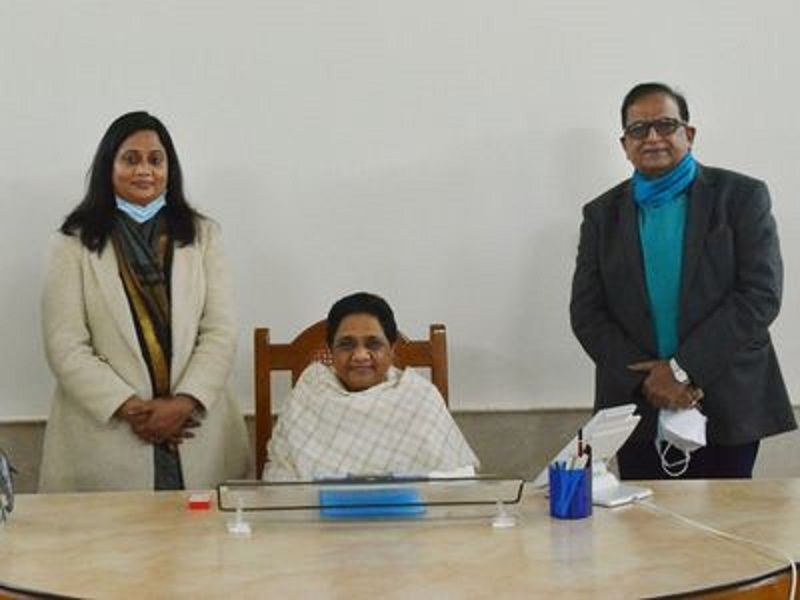Seema Samridhi also known as Seema Samridhi Kushwaha (born 10 January 1982) is an advocate at the Supreme Court of India and national spokesperson of Bahujan Samaj Party. She is known for being legal counsel of victim in 2012 Delhi gang rape and murder case. Because of her long legal fighting, all the four adult convicts were executed by hanging at Tihar Jail on 20 March 2020.
Early life and Education
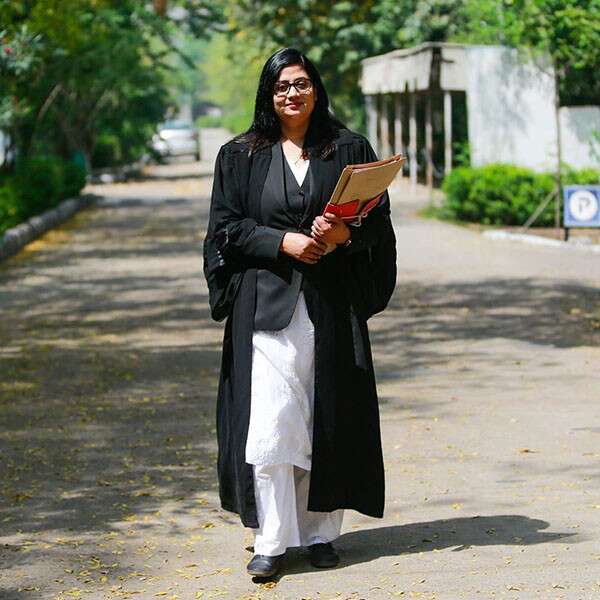
She was born in a small village Ugrapur, Gram Panchayat Bidhipur Block Mahewa Tehsil Chakarnagar in Etawah district of Uttar Pradesh to Baladin Kushwaha and Ramkuanri Kushwaha. Her father, Baladin Kushwaha was Gram Pradhan of Bidhipur Gram Panchayat. She completed her graduation in LL.B. from Chhatrapati Shahu Ji Maharaj University in 2005. She also received Bachelor of Journalism degree in 2006 from Uttar Pradesh Rajarshi Tandon Open University. After then, she did her M.A. in political science. She started legal practicing at the Supreme Court of India in 2014.
Legal activism
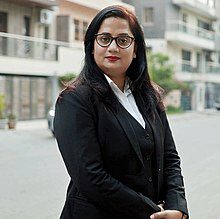
When Nirbhaya’s case came into light, she as a law trainee at that time participated in various protest demanding for justice. She officially became Nirbhaya’s lawyer in 2014 demanding capital punishment for all four adult convicts as soon as possible. On 24 January 2014, she joined Nirbhaya Jyoti Trust as a legal adviser. Nirbhaya Jyoti Trust is an institution founded by the victim’s parents to assist women who have experienced violence to find shelter and legal assistance. This was her first case. She pushed for Fast track court listing. Nevertheless, due to numerous review and curative petitions by convicts and slowness of the legal system, the case got delayed until finally, on 4 March 2020, a last death warrant was issued by court with the execution date as 20 March 2020 at 5:30 a.m. On 20 March 2020, at 5:30 a.m. IST, the four adult convicts were executed by hanging at Tihar Jail.
Seema Samridhi Age Husband Children Family Biography & More
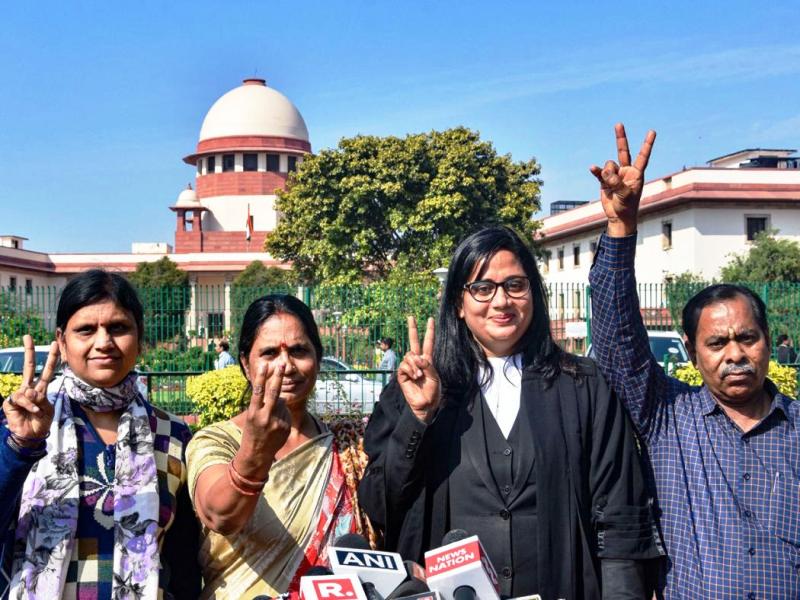
| Bio/Wiki | |
|---|---|
| Profession | Lawyer, Politician |
| Famous for | Fighting Nirbhya case (2012 – 2020) |
| Physical Stats & More | |
| Height (approx.) | in centimeters– 170 cm in meters– 1.70 m in feet & inches– 5’ 7” |
| Eye Colour | Black |
| Hair Colour | Black |
| Politics | |
| Political Party | Bahujan Samaj Party (BSP) |
| Political Journey | Joined BSP in Janaury 2022 |
| Personal Life | |
| Date of Birth | 2 October 1986 (Thursday) |
| Age (as of 2023) | 36 Years |
| Birthplace | Ugrapur, Etawah district of Uttar Pradesh |
| Zodiac sign | Libra |
| Nationality | Indian |
| Hometown | New Delhi |
| School | Kalavati Rampyari School in Lakhna town |
| College/University | • Ajitmal PG College • Kanupur University • Rajarshi Tandon Open University • Delhi University |
| Educational Qualification | 2005 : Completed graduation in Law from Kanupur University 2006 : Completed Bachelors in Journalism 2008 : MA in Political Science |
| Relationships & More | |
| Marital Status | Married |
| Family | |
| Husband/Spouse | Rakesh Kumar Kushwaha (advocate) |
| Parents | Father– Baladin Kushwaha, Gram Pradhan of Bidhipur Gram Panchayat Mother– Ramkuanri Kushwaha, Homemaker |
| Siblings | Brother– Two Sister– Four |
Some Lesser Known Facts About Seema Samridhi Kushwaha
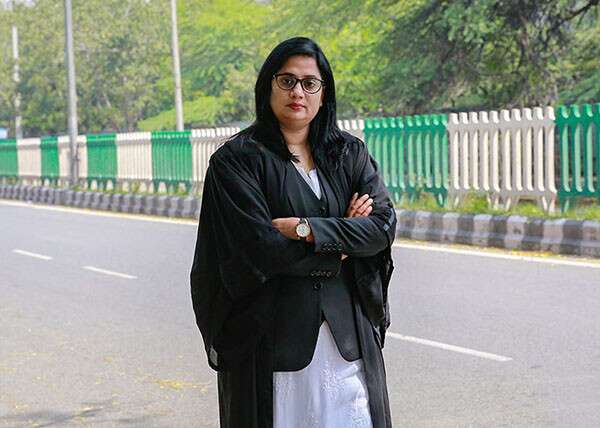
- Seema Kushwaha is an advocate, practising in the Supreme Court of India who is known for representing the victims of the Nirbhaya gang rape, in 2012 and the Hathras gang rape, in 2020
- In October 2021, she took the case of city businessman Manish Gupta who died following alleged torture by the police during a raid at a hotel in Gorakhpur.
- She hails from a small village in Uttar Pradesh. She said in an interview,
If you Google it, it wouldn’t show up–that’s how remote it is.” - She is the youngest child in her family having 2 elder brothers and 4 sisters. Her birth was not accepted by her family except by her father and aunt (her father’s sister). She revealed in an interview,
When my mother had me, a girl, everyone except my dad and bua was unhappy. The elders and even my mom considered killing me, ‘What will we do with one more girl? they debated. But bua and papa intervened and I got a shot at life.” - Seema belongs to a family, where the birth of a girl child was not accepted. Seema shared in an interview that she and her sisters were not treated equally to her brothers.
- Seema’s struggle started at the age of five. She used to travel 1 km to travel to school. Seema shared in an interview,
I fought to go to school which was 1 km away from my village. We had to cross a jungle to get there, but somehow 7 of us girls managed until the 8th grade. Post that all the girls in my class dropped out as the senior school was three kilometres away and the villagers were against it. But I was stubborn.” - Seema’s teacher, Jagdish Tripathi, forced her father to send her to school, and then, she became the first girl from her village to study beyond class eighth.
- Since childhood, Seema was intolerant of patriarchy and eve-teasing. Sharing her childhood memories, she said in an interview,
When a boy tried to pass cheap comments, I beat him black and blue. A crowd gathered & that guy began apologising, but I said, ‘Mein chodungi nahi tujhe!’ word spread. These boys would say, ‘Bahut dangerous ladki hain, usse panga mat lena, woh seedhe maarne lagti hain.” - She was a brilliant student and very devoted to her studies. Along with her studies, she used to be a part of extracurricular activities. While sharing her passion for learning, she said in an interview,
I didn’t care about much else. I put on my worn-out slippers, carried my jhola, took my brother’s cycle and went to class. I took part in everything. I gave speeches and even got chosen to captain my NCC team in Lucknow and again everyone in my village opposed. ‘She’ll go to the city and ruin our name,’ they said, but my dad supported me. I took money from my brother and without telling anyone, left for Lucknow. There, we won the competition and my name came in the paper, a small article about a village girl leading her team to victory.” - Seema sold her earrings and Payal and started teaching in a school to pay her college fees.
- When Kushwaha was in 10th standard, her family wanted her to get married, but a three-day hunger strike saved her from marriage. Again in 2002, when her father died, her eldest brother wanted her to get married but with the help of her friend, Rinky, she got admission to LLB and left home.
- She struggled very hard in her college days. She shared in an interview,
I used to take up jobs, sometimes walk to the class, sacrifice food and sleep, just so that I could become a lawyer.” - She hails from a village, where women were not given much respect in society. She said in an interview that there is a major difference in the status of women lawyers, in big and small cities. She said,
The status of women lawyers in Bombay or Delhi is different than those in smaller cities. In Kanpur, we were given no respect in courts, it was common for a woman lawyer to not get dates just because of her gender.” - She had also practised in Allahabad High Court around 2006.
- Seema was living in a PG, in Mukherjee Nagar, preparing for UPSC exams, when the Nirbhaya case happened in December 2012. She shared in an interview, the ambience of the next morning when they woke up and heard about the gang rape case. She said
I was suffering from mixed emotions of fear and anger. 12 girls from my PG immediately left Delhi, because their parents were terrified. I was gutted. I cried uncontrollably thinking about her, about what she went through. When more details started pouring in, something in me moved. I wiped my tears. All my life, I’d fought for myself, but this wasn’t the time to sit at home and cry–it was the time to get out there and fight back.” - She wanted to become an IAS officer, but after the Delhi gang rape case, she gave up her dream and decided to fight for Nirbhaya. She shared in an interview,
I used to assist several senior lawyers while practising in the Allahabad High Court. I also gave the Civil Judge exams, along with preparing for IAS. However, I exhausted my attempts and got involved with the parents of the December 16 victim. I knew that law was my calling.” [9] - Nirbhaya’s case was her first case and she didn’t charge any fees to fight it.
- She also protested at India Gate and organised a meeting in memory of Nirbahaya, to which she invited Nirbhaya’s parents.
Seema Kushwaha protesting for justice in Nirbhaya’s case
- In 2014, Seema decided to fight for Nirbhaya. She shared in an interview the conversation she had with Nirbhaya’s mother and said,
When I spoke to aunty, she said to me, ‘I don’t think my daughter will get justice. That’s when I promised her– ‘I’ll fight for Jyoti. I’ll take the case, hum chodenge Nahi unhe.” - On 24 January 2014, she joined the Nirbhaya Jyoti Trust as a legal advisor, which provides shelter and legal help to women, who have experienced violence.
- After fighting the battle of justice for 7 years, her efforts paid off, and the four culprits of the Nirbhaya case were hanged to death at 5:30 a.m., on 20 March 2020
Seema with Nirbhaya’s parents showing victory sign after winning the case
- Kushwaha shared in an interview that she received rape threats after the culprits of Nirbhaya were hung. She said,
After they were hung, I began receiving threats on my social media handles. They abused me and said things like, ‘We’ll rape you worse than Jyoti.”
- After Nirbhaya’s case, Seema fought for the victim of Hathras gang rape and became the voice of many women suffering from the same pain. She revealed in an interview that she wants to reach out and fight for every suffering woman. She added,
I’ve received over 500 messages from women, some send me pictures of the FIRs they’ve filed to no avail and others tell me about how they’ve been raped, harassed or violated without any justice. I’m going to reach out to all of them to say, ‘Hum chodenge Nahi unhe’. The fight has just begun.” - Post the judgment of the Nirbhaya case, she had over 100 harassment cases in hand. She said in an interview,
This may be my first case but not the last. I want to continue my campaigns on gender crimes not only against women but also men.” - On 20 January 2022, she joined BSP ahead of the UP election. She said in an interview that she is joining the party to ensure justice for the weaker section of society.
